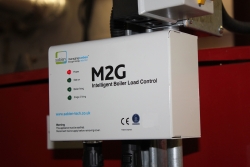Delivering further efficiencies from fully modulating boilers.

There are a number of contributory factors that can cause ‘fully modulating’ boilers to dry and short cycle. Tony Willis, Technical Director with Sabien Technology, discusses the issues.
There is sometimes a perception that fully modulating boilers are not subject to the inherent issue of wasteful boiler dry and short cycling, in the same way that non-modulating, high-low fired boilers are.
All boilers, including fully modulating boilers, will suffer from ‘standing losses’. This can cause the boiler set point temperature to drop so that the boiler re-fires when there is no genuine requirement for further heat to meet the building load. This condition is known as ‘dry cycling’ which causes unnecessary energy use and costs.
To improve boiler efficiency, there has been a drive to employ fully modulating boilers. In theory a modulating boiler will always meet and track a variable boiler load and never turn off. Therefore it will not allow the boiler to dry/short cycle. However, there are number of conditions that will limit the boiler from modulating during part-load conditions.
The performance of a modulating boiler is determined by the ‘turn down’ ratio of the burner and the current load applied to the boiler. It is quite common that modern modulating boilers will have a turn down ratio of 5 to 1; in other words high fire is 100% of the boiler kW output and low fire would be 20% of the boiler output. For example if the boiler was rated at 200 kW the minimum boiler output capacity would be 40 kW.
Building/ boiler loads will change dynamically according to the weather/ hot water requirements etc. If the above example is used and the current system load is less than 40 kW, the modulating boiler is not able meet this part-load condition without turning on/off and cause the boiler to cycle.

Other factors that can affect the performance of modulating boilers are due to an improvement of the overall building efficiency. Typically boiler plant is designed to meet the worst case scenario regarding building load and over time the boiler/s can become over-capacity for the current building conditions. 80% of boiler plant is over capacity and therefore can cause ‘part-load’ boiler inefficiencies.
For some of the reasons given, it is very rare that fully modulating boilers operate as intended or designed and can suffer from the same issues as standard non-modulating boilers.
The solution is to deploy retrofit boiler load optimisation controls such as Sabien’s M2G, which will work in harmony with existing controls to prevent boiler dry/ short cycling and reduce energy consumption. The M2G will constantly and dynamically measure the individual boiler load under all conditions, if this is on a fully modulating boiler the M2G will operate during part-loads only and will identify when the boiler is firing unnecessary.
M2G will typically deliver a payback in less than 18 months and requires no servicing, maintenance or continued commissioning and is offered with a 5 year warranty.








